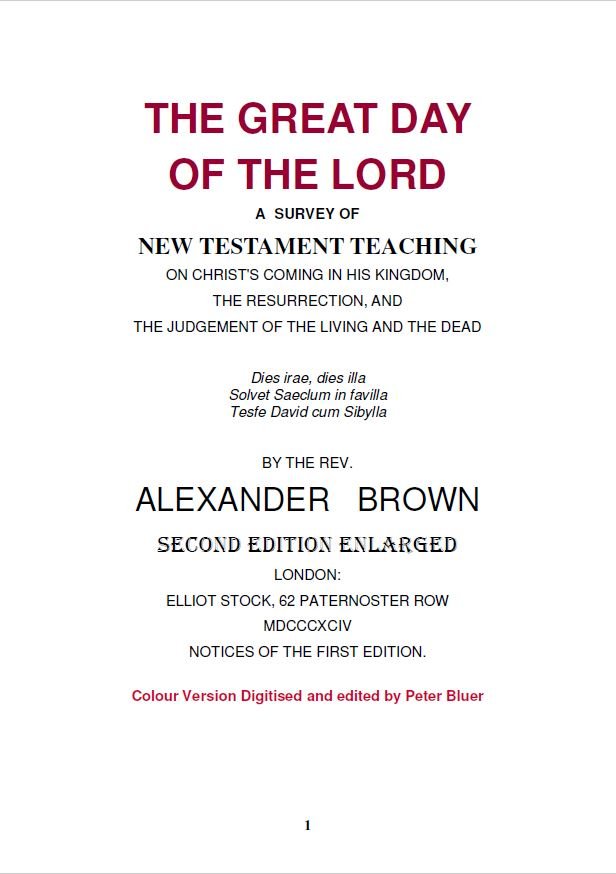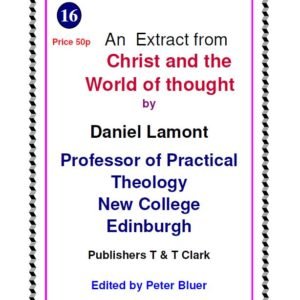PREFACE.
————|————–
IT is greatly to be desired that Christian scholars and — divines should
thoroughly re-consider that interesting field of doctrine known as
“Eschatology.” Current opinions on “Last Things” are widely and
increasingly felt to be dependent upon a highly artificial system of
interpretation, and even then are marred by evident inconsistencies,
and scarred by visible self-contradictions. The practical results,
besides, have been deplorably unwholesome to Christian life, making it
unduly sectarian, feverish, and materialistic, as well as damaging to the
claims of Scripture as an authentic record of the teachings of our Lord and
His Apostles.
This book is a humble plea with all who are concerned with Scripture
interpretation to re-consider the whole question of the Coming and
Kingdom of Christ. It proceeds upon the principle that prophecy is not
couched in occult or deceptive language, though strongly Hebraistic in
conception and expression, and aims at showing that what Christ and
His Apostles foretold was strictly true when their language is
interpreted in its direct sense, and in remembrance of the spiritual ends
they had in view. The substantial accuracy of our conclusions may almost
be presumed from the fact that New Testament prophecy is found selfconsistent
and easy of interpretation, and the outcome entirely worthy of
the Gospel of God’s salvation.
Our method is by the necessities of the case strictly exegetical, and we
extend to each book a separate, though sometimes brief examination. We
give the first and most prominent place to the Apocalypse for diverse
reasons. It is the one New Testament book which is professedly
concerned with the Second Advent, and is constructed pictorially to
answer to the Biblical phrase which is the title of this work — its evening
and morning prophecies together making up that epoch of judgement
known to the closing centuries of the Jewish dispensation as ” The Great
Day of the Lord.” In keeping with this design, it is not only the fullest
Scripture dealing with our subject but at the same time the simplest;
because, in spite of its allegorical scenes and Cabbalistic hints, it is the
richest in detail as to the time, the nature, and the sphere of our Lord’s
Coming in His Kingdom. The other books of the New Testament are
accordingly treated as subsidiary and corroborative, the only further light
found in them being what St. Paul teaches as to the origin and
development of the resurrection body. The one drawback of our method
is that it leads to a repetition of texts and of ideas; but on the other hand,
4
such repetition may the better drive home the unfamiliar teachings of this
work, and the more forcibly exhibit the perfect agreement which exists
between all the New Testament books as to the facts of our Lord’s Second
Coming.
We have not thought it needful to discuss the authorship, date, and
structure of our piece de resistance, the Apocalypse. The exigencies of
the case do not tie us to any particular opinion. The book might have been
written in part as a theological explanation of events already past, or in
anticipation of events about to come. However, the evidence for the latest
date consistent with the authorship of St. John is so scant, and dubious
at the best, while the internal evidence for the earlier date is so
exceedingly strong and so clearly supported by traditions almost equal in
authority and more than equal in probability to those which support the
first; that we cannot refuse our belief to the earlier date fixed for its origin.
In any case, what we find to be the only possible interpretation of the book
is in itself a strong presumption of its early and apostolic origin.
Our readers will probably not find fault with us for endeavouring, not
merely to elucidate the prophetic sense of Scripture, but to accompany it
with those lessons of life and godliness with which true prophecy is always
charged. As New Testament prophecy is here interpreted it will be seen
that its message is an essential portion of the Gospel of our salvation, and
lends itself easily to didactic purposes. The first edition of this book was
published four years ago, and was received with a favour for which we
return our sincerest thanks. This edition adds to the first a more careful
examination of the other New Testament books than could be given when
these were only cursorily cited to point out their agreement with certain
teachings in the Apocalypse.
It is hoped that this enlargement will make the volume increasingly useful;
and certainly, the eschatological parts of the Gospels and Epistles are as
commonly misunderstood as the so-called mysterious Apocalypse itself. In
conclusion, we would in all sincerity assure any readers whose minds may
be pre-occupied with the more sensational doctrines now popular that, on
calm consideration, they will find the views here presented not only more
distinctly scriptural, but more helpful to Christian life and more comforting
in view of death and the infinite beyond. One thing we assert as beyond all
question, because now vouched for by a very wide experience, that to
those who this key the entire Bible becomes a more luminous and helpful
book, and many passages that before seemed confused, contradictory, or
even meaningless, cease to be perplexing and become radiant with a
satisfactory meaning. May the divine blessing lead each reader into the
knowledge of the truth.
ABERDEEN, October, 1894.





